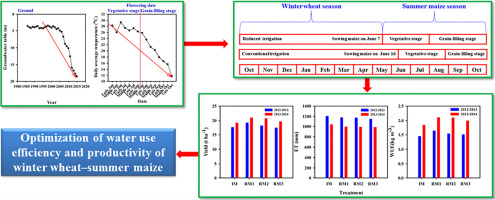Science of the Total Environment ( IF 8.2 ) Pub Date : 2017-11-08 , DOI: 10.1016/j.scitotenv.2017.10.284 Yunqi Wang , Yinghua Zhang , Rui Zhang , Jinpeng Li , Meng Zhang , Shunli Zhou , Zhimin Wang

|
The groundwater table has fallen sharply over the last 30 years on the North China Plain, resulting in a shortage of water for winter wheat irrigation. Reducing irrigation may be an important strategy to maintain agricultural sustainability in the region; however, few studies have evaluated the transition from conventional irrigation management practices to reduced irrigation management practices in the winter wheat-summer maize rotation system. Here, we compare the yield, water consumption, and water use efficiency of winter wheat-summer maize rotation under conventional irrigation and reduced irrigation on the North China Plain from 2012 to 2015. Reducing irrigation decreased the yield but increased the water use efficiency and significantly advanced the harvest date of winter wheat. As a result, the summer maize sowing date advanced significantly, and the flowering date subsequently advanced 2–8 days, thus extending the summer maize grain-filling stage. Therefore, the yield and water use efficiency of summer maize were higher under reduced irrigation than conventional irrigation, which compensated for the winter wheat yield loss under reduced irrigation. In addition, under reduced irrigation from 2012 to 2015, the yield and water use efficiency advantage of the winter wheat-summer maize rotation ranged from 0.0 to 9.7% and from 4.1 to 14.7%, respectively, and water consumption and irrigated water decreased by 20–61 mm and 150 mm, respectively, compared to conventional irrigation. Overall, the reduced irrigation management practice involving no irrigation after sowing winter wheat, and sowing summer maize on June 7 produced the most favorable grain yield with superb water use efficiency in the winter wheat-summer maize rotation. This study indicates that reducing irrigation could be an efficient means to cope with water resource shortages while maintaining crop production sustainability on the North China Plain.
中文翻译:

减少灌溉增加了华北平原冬小麦-夏玉米轮作的水分利用效率和生产力
在过去的30年中,华北平原的地下水位急剧下降,导致冬小麦灌溉用水短缺。减少灌溉可能是维持该地区农业可持续性的重要战略;但是,很少有研究评估冬小麦-夏季玉米轮作系统中从常规灌溉管理方式向减少灌溉管理方式的转变。在此,我们比较了2012年至2015年华北平原常规灌溉和节水灌溉条件下冬小麦-夏季玉米轮作的产量,耗水量和水分利用效率。减少灌溉量可降低产量,但可以提高水分利用效率,并且显着提高了灌溉效率。提前了冬小麦的收获日期。因此,夏季玉米的播种期明显延长,随后的开花期提前了2–8天,从而延长了夏季玉米的灌浆期。因此,减少灌溉条件下夏玉米的产量和水分利用效率均高于常规灌溉,弥补了减少灌溉条件下冬小麦单产的损失。此外,在2012年至2015年减少灌溉的情况下,冬小麦-夏季玉米轮作的产量和水分利用效率优势分别为0.0%至9.7%和4.1%至14.7%,耗水量和灌溉水量减少了20%与常规灌溉相比,分别为–61毫米和150毫米。总体而言,减少灌溉管理的做法是在播种冬小麦后不进行灌溉,在冬小麦-夏季玉米轮作中,6月7日播种的夏玉米产量最高,水分利用效率最高,因此播种的玉米最有利。这项研究表明,减少灌溉可能是解决水资源短缺的有效方法,同时又能维持华北平原作物生产的可持续性。











































 京公网安备 11010802027423号
京公网安备 11010802027423号